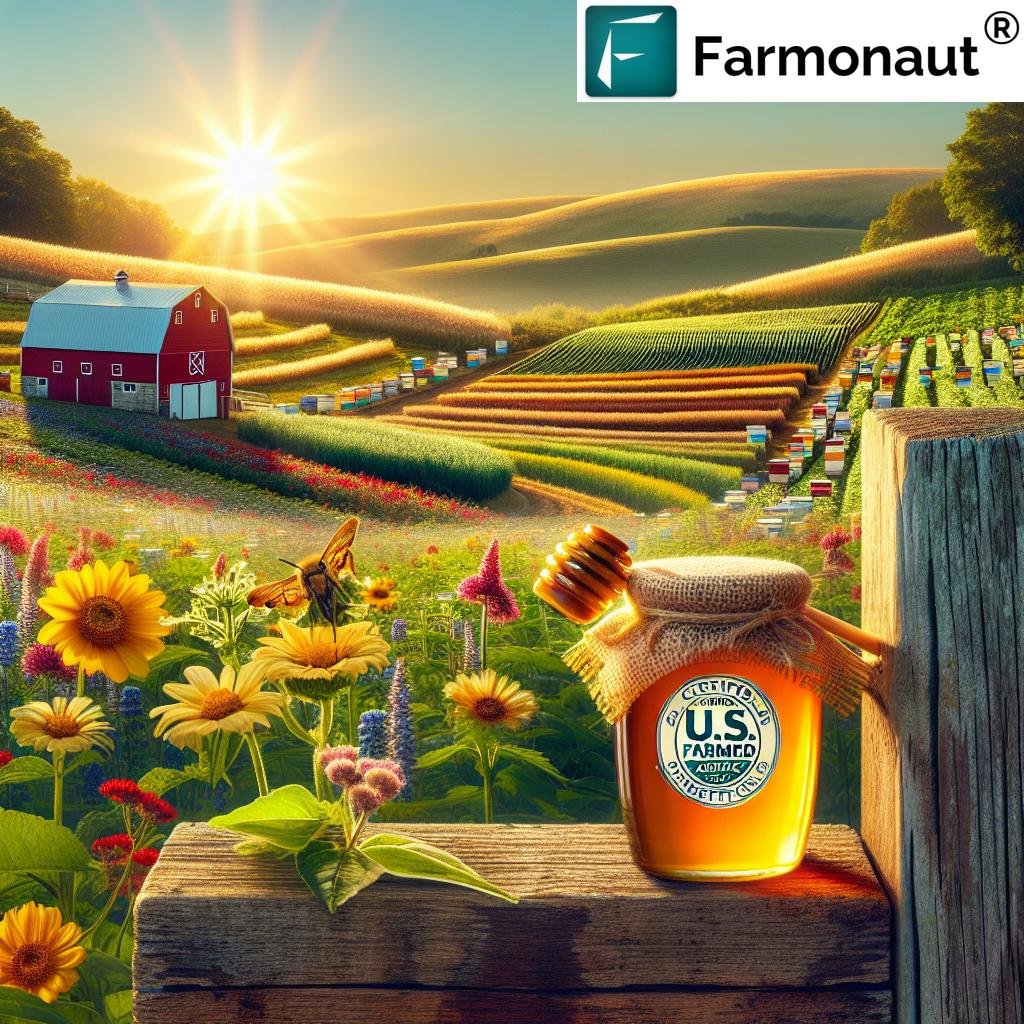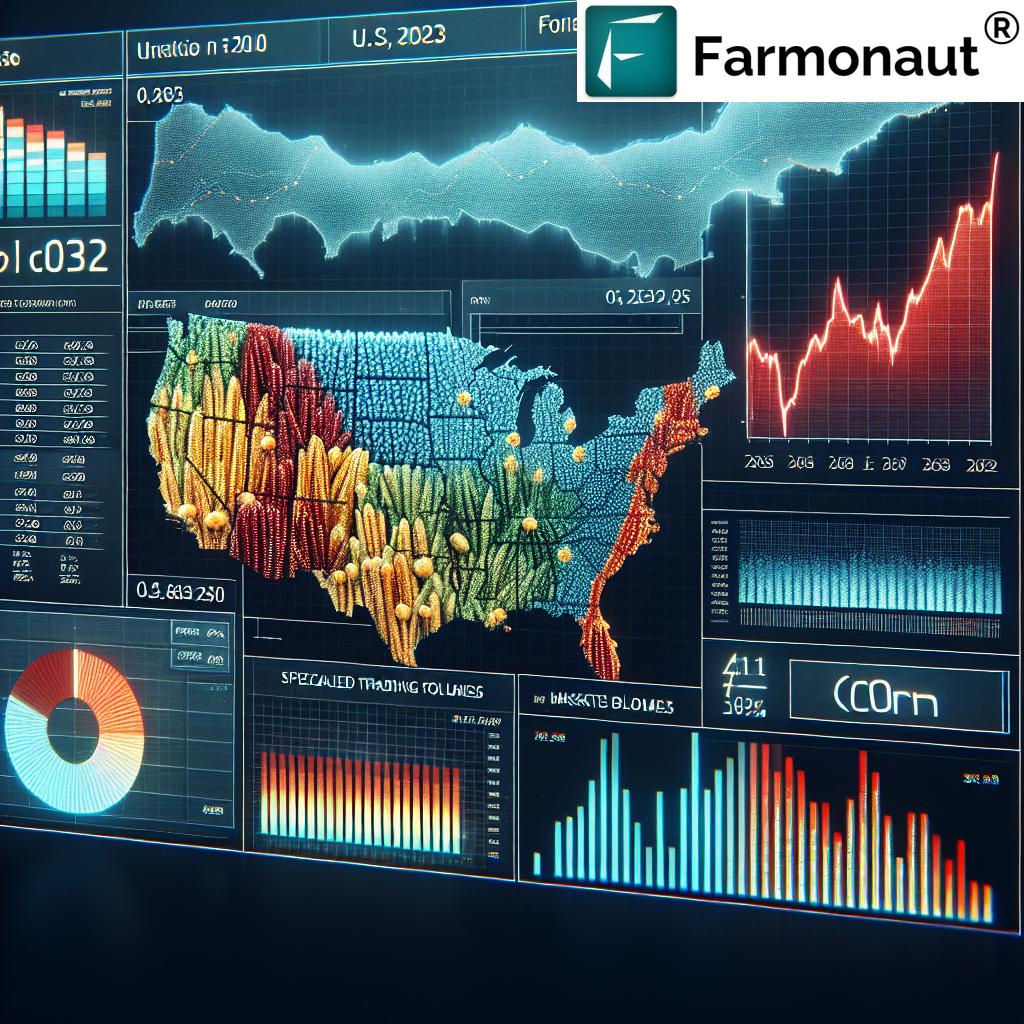U.S. Farmed Certified Honey: How Sustainable Agriculture Practices Are Saving American Farmland
“U.S. Farmed™ certified honey requires at least 95% of ingredients to be sourced from American farmland.”
In an era where sustainability and local sourcing have become paramount, we are witnessing a revolutionary change in the American honey industry. The introduction of U.S. Farmed™ certified honey marks a significant milestone in our journey towards preserving American farmland and supporting our local farmers. This groundbreaking initiative not only ensures the quality and origin of honey products but also plays a crucial role in sustaining our agricultural heritage.
The Dawn of a New Era in American Honey Production
On February 10, 2025, the landscape of American honey production underwent a transformative change. The Sioux Honey Association Co-op, a venerable institution in honey production since 1921, joined forces with the American Farmland Trust (AFT) to launch the U.S. Farmed™ certified honey standard. This collaboration between a renowned honey producer and a national nonprofit organization addresses the rising demand for sustainable agriculture practices and locally grown ingredients.
The U.S. Farmed™ certification is more than just a label; it’s a promise to consumers and a lifeline to American farmers. By ensuring that at least 95% of ingredients in consumer-packaged honey products are sourced from United States farmland, this certification sets a new benchmark for transparency and sustainability in food production.

The Significance of U.S. Farmed™ Certification
The U.S. Farmed™ certification is not just another label on a honey jar. It represents a commitment to:
- Supporting American Farmers: By choosing certified products, consumers directly contribute to the sustainability and vitality of the U.S. agricultural sector.
- Preserving Farmland: Each sale generates funds that support AFT’s mission to preserve farmland across all states.
- Promoting Transparency: The certification ensures clarity about the origin of honey products, addressing the consumer demand for transparency in food sourcing.
- Encouraging Sustainable Practices: It incentivizes farmers to adopt and maintain sustainable agricultural methods.
This initiative aligns perfectly with the growing consumer preference for products that support local economies and environmentally responsible practices. By choosing U.S. Farmed™ certified honey, consumers are not just purchasing a product; they’re investing in the future of American agriculture.
The Impact on American Farmland
The introduction of U.S. Farmed™ certified honey is set to have a profound impact on American farmland. Here’s how:
- Preservation of Agricultural Land: By creating a demand for U.S.-sourced honey, this certification helps keep farmland in active production, combating the trend of farmland loss to development.
- Economic Support for Farmers: The increased focus on local sourcing provides a more stable market for American beekeepers and farmers, encouraging them to maintain their land for agricultural use.
- Promotion of Biodiversity: Honey production supports pollinator habitats, which are crucial for maintaining biodiversity in agricultural landscapes.
- Encouragement of Sustainable Practices: The certification promotes farming methods that are in harmony with nature, ensuring long-term land viability.
The Role of Technology in Sustainable Agriculture
While initiatives like U.S. Farmed™ certification are crucial, technology plays an equally important role in promoting sustainable agriculture. Companies like Farmonaut are at the forefront of this technological revolution in farming.
Farmonaut offers advanced, satellite-based farm management solutions that make precision agriculture affordable and accessible to farmers worldwide. Through its android, iOS, web/browser App, and API, Farmonaut integrates innovative technology and data-driven insights into traditional farming practices.
Some key features of Farmonaut’s platform include:
- Real-time crop health monitoring
- AI-based advisory systems
- Blockchain-based traceability
- Resource management tools
These technologies enable farmers to make informed decisions about irrigation, fertilizer usage, and pest management, ultimately optimizing crop yields and reducing resource wastage. This aligns perfectly with the goals of sustainable agriculture practices promoted by initiatives like U.S. Farmed™ certification.

The Consumer’s Role in Supporting Sustainable Agriculture
As consumers, we have the power to drive change through our purchasing decisions. By choosing U.S. Farmed™ certified honey, we can:
- Support local farmers and beekeepers
- Contribute to farmland preservation initiatives
- Promote transparent food production
- Encourage sustainable agriculture practices
- Boost the American agricultural economy
Every jar of certified honey purchased is a vote for a more sustainable and transparent food system. It’s a small action that, when multiplied across millions of consumers, can have a significant impact on the future of American agriculture.
“The U.S. honey industry’s new certification addresses rising demand for sustainable agriculture and locally grown ingredients.”
The Future of American Agriculture
The introduction of U.S. Farmed™ certified honey is just the beginning. This initiative sets a precedent for other agricultural sectors to follow, potentially leading to a wider adoption of similar certifications across various food products. As consumers become more conscious of their food choices and their impact on the environment and local economies, we can expect to see:
- Increased demand for locally sourced and certified products
- Greater investment in sustainable farming practices
- More support for initiatives that preserve American farmland
- A stronger, more resilient American agricultural sector
The Role of Technology in Supporting U.S. Farmed™ Certification
As we move towards a more sustainable and transparent agricultural system, technology will play a crucial role in supporting initiatives like the U.S. Farmed™ certification. Farmonaut’s suite of tools can significantly contribute to this effort:
- Satellite-Based Crop Health Monitoring: This technology can help beekeepers and farmers monitor the health of flowering plants crucial for honey production, ensuring a sustainable environment for bees.
- Jeevn AI Advisory System: By providing real-time insights and expert crop management strategies, this system can help farmers maintain the high standards required for U.S. Farmed™ certification.
- Blockchain-Based Product Traceability: This feature aligns perfectly with the transparency goals of the U.S. Farmed™ certification, allowing consumers to trace their honey from hive to shelf.
- Carbon Footprinting: As sustainability becomes increasingly important, this tool can help honey producers monitor and reduce their environmental impact, further enhancing the value of U.S. Farmed™ certified honey.
Farmers and beekeepers can access these tools through Farmonaut’s Android app, iOS app, or web application.
The Economic Impact of U.S. Farmed™ Certified Honey
The introduction of U.S. Farmed™ certified honey is expected to have a significant positive impact on the American agricultural economy. Here’s how:
- Increased Revenue for Local Farmers: As demand for certified honey grows, local beekeepers and farmers can expect to see an increase in their revenue.
- Job Creation: The focus on local sourcing can lead to job creation in rural communities, from beekeeping to processing and packaging.
- Investment in Agricultural Infrastructure: The certification may encourage investment in agricultural infrastructure to meet the growing demand for certified honey.
- Boost to Related Industries: Industries related to beekeeping and honey production, such as equipment manufacturers and packaging companies, may also see growth.
- Increased Export Potential: As U.S. Farmed™ certified honey gains recognition, it could open up new export markets, further boosting the American agricultural economy.
The Environmental Benefits of Supporting U.S. Farmed™ Certified Honey
Choosing U.S. Farmed™ certified honey doesn’t just support American farmers; it also contributes to environmental conservation. Here’s how:
- Reduced Carbon Footprint: By sourcing honey locally, we reduce the need for long-distance transportation, thereby lowering carbon emissions.
- Preservation of Bee Habitats: Supporting local beekeepers helps maintain and expand bee habitats, which are crucial for pollination and biodiversity.
- Promotion of Sustainable Farming Practices: The certification encourages farming methods that are in harmony with nature, promoting soil health and reducing the use of harmful pesticides.
- Conservation of Water Resources: Many sustainable beekeeping practices also focus on water conservation, an increasingly important issue in many parts of the United States.
By supporting these environmental benefits, consumers of U.S. Farmed™ certified honey are contributing to a healthier, more sustainable ecosystem.
The Future of U.S. Farmed™ Certification
While the U.S. Farmed™ certification currently applies to honey, its success could pave the way for similar certifications in other agricultural sectors. We might see this model expanded to include:
- Fruits and vegetables
- Dairy products
- Meat and poultry
- Grains and cereals
Such expansion would further strengthen the American agricultural sector, providing consumers with more options to support local farmers and sustainable practices across a wide range of products.
The Role of Education in Promoting Sustainable Agriculture
As we move towards a more sustainable agricultural future, education plays a crucial role. Consumers need to understand the importance of initiatives like U.S. Farmed™ certification and the impact of their choices. Here’s how education can support this movement:
- Consumer Awareness Programs: Educating consumers about the benefits of choosing certified local products can drive demand for sustainable goods.
- Farmer Training: Programs that teach farmers about sustainable practices and the benefits of certification can encourage wider adoption.
- School Curriculum: Incorporating lessons about sustainable agriculture and local food systems in school curricula can help raise a generation of conscious consumers.
- Community Outreach: Local events and workshops can help spread awareness about the importance of supporting local agriculture.
Technology can play a significant role in these educational efforts. For instance, Farmonaut’s platform can be used to demonstrate the benefits of precision agriculture and sustainable farming practices to both farmers and consumers.
U.S. Farmed™ Certified Honey: A Comparative Analysis
To better understand the impact of U.S. Farmed™ certified honey, let’s compare it with non-certified honey across various sustainability metrics:
| Metric | U.S. Farmed™ Certified Honey | Non-Certified Honey |
|---|---|---|
| Percentage of U.S. sourced ingredients | At least 95% | Variable, often lower |
| Farmland preservation (acres supported) | Estimated 100,000+ acres | Not directly supported |
| Carbon footprint (CO2 emissions per pound) | Lower due to local sourcing | Higher due to potential long-distance transport |
| Local farmer support (estimated income increase) | Up to 20% increase | No guaranteed increase |
| Transparency in production (traceability score) | High (fully traceable) | Variable, often lower |
| Economic impact on U.S. agriculture ($ millions) | Estimated $50+ million annually | Variable, often lower impact |
This comparison clearly illustrates the significant benefits of choosing U.S. Farmed™ certified honey, not just for consumers, but for American farmers, the environment, and the economy as a whole.
The Global Impact of U.S. Farmed™ Certification
While the U.S. Farmed™ certification is focused on American agriculture, its impact could be felt globally. Here’s how:
- Setting a Global Standard: The U.S. Farmed™ certification could serve as a model for other countries looking to promote local, sustainable agriculture.
- Influencing International Trade: As consumers worldwide become more conscious of sustainability, demand for certified products like U.S. Farmed™ honey could increase, potentially influencing international trade patterns.
- Promoting Sustainable Practices Worldwide: The success of this certification could encourage farmers and policymakers around the globe to adopt similar sustainable practices.
- Addressing Global Food Security: By promoting sustainable local agriculture, initiatives like U.S. Farmed™ certification contribute to global food security efforts.
As we look to the future, the principles behind U.S. Farmed™ certification – sustainability, transparency, and support for local agriculture – are likely to become increasingly important on a global scale.
Frequently Asked Questions
Q: What exactly is U.S. Farmed™ certified honey?
A: U.S. Farmed™ certified honey is honey that contains at least 95% of ingredients sourced from United States farmland. This certification ensures transparency in food production and supports American farmers.
Q: How does buying U.S. Farmed™ certified honey help American farmers?
A: By purchasing U.S. Farmed™ certified honey, you’re directly supporting American beekeepers and farmers. A portion of each sale goes towards farmland preservation initiatives and resources to help farmers maintain their land.
Q: Is U.S. Farmed™ certified honey more expensive than regular honey?
A: While prices may vary, any potential increase in cost reflects the investment in sustainable farming practices and support for local agriculture. The benefits to American farmers and the environment often justify the price difference.
Q: How can I be sure that U.S. Farmed™ certified honey is truly sourced from the United States?
A: The U.S. Farmed™ certification process involves rigorous verification to ensure that at least 95% of ingredients are sourced from U.S. farmland. This transparency is a key aspect of the certification.
Q: Are there plans to expand U.S. Farmed™ certification to other products?
A: While currently focused on honey, the success of this certification could potentially lead to similar initiatives for other agricultural products in the future.
Conclusion: A Sweet Future for American Agriculture
The introduction of U.S. Farmed™ certified honey marks a significant milestone in the journey towards a more sustainable and transparent agricultural system in the United States. By choosing these certified products, we as consumers have the power to support American farmers, preserve farmland, and contribute to environmentally friendly farming practices.
As we look to the future, initiatives like U.S. Farmed™ certification, combined with technological advancements in agriculture, offer a promising path forward. They provide a blueprint for how we can support local economies, ensure food security, and promote sustainable practices across the agricultural sector.
The sweet taste of U.S. Farmed™ certified honey is more than just a treat for our taste buds – it’s a vote for the future of American agriculture. Every jar purchased is a step towards a more sustainable, transparent, and locally-focused food system. As we continue to face challenges in agriculture and environmental conservation, such initiatives remind us that even small choices can have a significant impact.
Let’s embrace this opportunity to support our local farmers, preserve our farmland, and contribute to a more sustainable future. The next time you reach for a jar of honey, look for the U.S. Farmed™ certification – it’s a small choice that can make a big difference.
Earn With Farmonaut: Affiliate Program
Earn 20% recurring commission with Farmonaut’s affiliate program by sharing your promo code and helping farmers save 10%. Onboard 10 Elite farmers monthly to earn a minimum of $148,000 annually—start now and grow your income!
For more information on how technology is revolutionizing agriculture, visit Farmonaut’s web application or check out their mobile apps:
Together, we can create a sweeter, more sustainable future for American agriculture.















